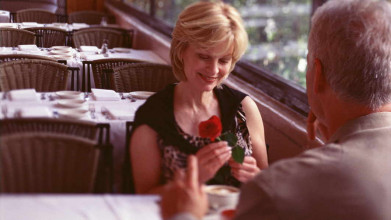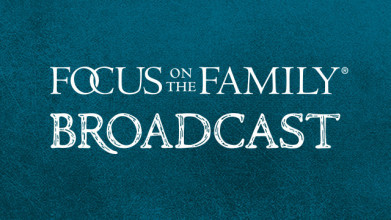
The War of Words
In this Adventures in Odyssey drama, a carelessly uttered word from Eugene creates havoc as it becomes the fashionable insult, resulting in a lesson about the power of words.
Home » Episodes » Focus on the Family Broadcast » Fun Ways to Pep Up Your Marriage
Preview:
Man #1: My wife isn’t into the traditional things like candy or flowers, so what she really appreciates is a back rub or a foot rub. And I have to do that without any agenda, of course.
Woman #1: My husband really likes to go to the movies, and so, every week I – on Thursday evening, I try to see what’s gonna be on that he might like and and start planning a date night for him.
Man #2: My wife, I believe, appreciates getting to rest in the morning while I make breakfast for her, and I love doing that and taking care of our daughter.
End of Preview
John Fuller: Some good reminders for all of us who are married to spend more time together as a couple, to serve each other, and really reconnect and refresh our marriages. You’re gonna hear more about that today on Focus on the Family with your host, Focus President and author, Jim Daly. And I’m John Fuller.
Jim Daly: John, I- I think all of us who have been married more than a few years, uh, need those kinds of reminders, simple ideas that don’t require a lot of planning or expense or extravagance, just thoughtfulness. And sure, having special dates is important. Candlelight dinners or a weekend getaway, uh, they’re lots of fun and they will create special memories for you as a couple, but those are not everyday life situations. I mean, it’s great to come up with something every so often, but every day’s tough. Always showing love to your spouse, uh, is obvious, but kind of those deep plans, uh, they’re more sporadic, uh, and you certainly don’t wanna keep a romance quota between each other.
John: Mm-hmm.
Jim: “You haven’t met my quota,” you know…
John: (laughs) Yeah.
Jim: to your spouse is not a good way to start your morning discussion.
John: Hm.
Jim: We’re all at a different, uh, season of life. Uh, for example, you may be raising young children on a limited budget, so you can’t do much. Or your work schedules are so different that finding time together as a couple is pretty difficult.
John: Of, if I may, Jim, uh, like you and I have confessed before here on this broadcast, there are times when you get home and you’re just brain dead. (laughs)
Jim: (laughs)
John: And- and there’s like, “I got nothing for you, darling. I’m so sorry.”
Jim: Far too often. (laughs) It’s so true, John. Uh, welcome to the club by the way, but we can’t let that extreme, uh, become our normal routine either where we just-
John: Mm-hmm.
Jim: um, you know, ignore our spouse-
John: Mm-hmm.
Jim: and chalk it up to fatigue. Marriages can’t survive on cruise control. Uh, what we need is something in between, a balanced approach where you find those simple everyday ways of saying, “I love you and I still care about you,” and to, uh, reach out to each other. And I know our guest, Kathi Lipp, is going to help us emphasize that message today.
John: Yeah, we have a great conversation recorded with Kathi, uh, a while ago about her book Happy Habits for Every Couple: 21 Days to a Better Relationship. And Jim, here’s how you began the conversation on Focus on the Family.
Jim: Uh, let’s get right down to it. Do we have to be that methodical to get to a good (laughs) relationship?
Kathi Lipp: Well, I think that… Okay, let’s talk about this. We’ve been talking, um, off the air a little bit about running and exercising and things like that, and I don’t think that a marriage is any different than trying to get health… You know whether it’s healthy in your life or healthy in your marriage, if you’re saying, “Okay. Well, I’m gonna be running a 5K, but I’ll do that on the day,” you know, and not doing the prep for it-
Jim: (laughs) Ouch.
Kathi: … you’re gonna be in pain. Exactly. There’s gonna be some soreness and some other things involved, but I do think that we need to be a bit intentional about our marriages. And that’s not to put a burden on anybody, this is all good stuff, this is all fun stuff, but there does have to be a bit of a plan because you can go, especially depending on the season of your life, we were talking about that, you could go for a month and not have a real in-depth conversation except about the bills or maybe the trouble your kid’s in at school.
John: Mm-hmm.
Kathi: And if you’re not pouring into that relationship, those r- conversations are so draining, you could end up feeling like, “Wow, this is really tough.”
John: Mm-hmm.
Jim: Kathi, you know what’s hard with, I- diet is a great… For me, it’s that analogy. You want to lose weight, you know.
Kathi: Mm-hmm.
Jim: So you say, “Okay, I’m not gonna eat these things,” but then all of a sudden, it’s like you’re craving those things.
Kathi: Mm-hmm.
Jim: And then you end up eating the very things that are not the right things to eat.
Kathi: Right.
Jim: More so than if you were kind of ignoring it all.
Kathi: Yes.
Jim: It- it’s such a- an odd thing. Why does the human spirit, (laughs) why do we gravitate toward doing the very thing we shouldn’t do?
Kathi: (laughs) Well, uh, you know, God started talking about that back in Genesis. You know, we want what we can’t have or shouldn’t have. And we are created f- for so much than that. We are created to have these healthy relationships, these things that God wants us to be able to enjoy. He wants us to be able to enjoy our marriage, enjoy our partner, but when we’re stuck in the minutia of all that has to get done to th- during the day, and we’re putting our emphasis on the urgent instead of the important, and the important is that relationship.
John: Mm.
Kathi: Then it’s easy to get distracted and spend our time wanting the things that we don’t necessarily need.
Jim: And it’s really well said. And I don’t know about you, John, I can relate to that, putting your emphasis on the urgent rather than the important.
John: Mm-hmm.
Kathi: Yeah.
Jim: That’s a great way to say it because, uh, so often those things that are most important to us, we neglect. And our relationships within the family are certainly one of them. I know as a father that that is a burden that I have at times. Not just with Jean my spouse, but often as a dad, I… You know, I travel quite a bit and I’ll- I’ll feel that burden that, um, you know, I’m not there at that moment for my sons.
Kathi: Yeah.
Jim: I try to be.
Kathi: Right.
Jim: I mean, it’s- it’s one of the burning desires of my heart to make sure that I’m the dad that they need, but I still fall short, and it’s so frustrating. It’s so frustrating to be human. (laughs)
Kathi: To have real life get in the midst of what is really, really important. And I think that, you know, part of what I’m talking about in the book is that it’s not saying, “Okay, every single day we’re gonna spend two hours looking longingly into each other’s eyes,” and…
Jim: Well, what does it look like?
Kathi: I think it looks like a lot of little things.
Jim: Hm.
Kathi: A lot of little things, and it’s about paying attention and being intentional. So, uh, most of the things in the book are… You know, I give you 21 projects, these little things to do. And th- it’s not every day for each of the spouses, but one day it’s saying, “You know what? You know what your husband’s favorite candy bar is. Sometime this week, pick it up, put it on his nightstand, tell him he doesn’t have to share with you or the kids or the dog.”
Jim: (laughs)
Kathi: It’s the little things to just say… It’s going back to when we were dating or maybe when we were engaged, and our mind was on our spouse all the time. We couldn’t help but think about them. It was hard to work. It was hard to do anything else in life because we were so concentrated on that relationship. And then the marriage happens, and daily routines happen and then kids come along, and it’s easy to lose a little bit of that. And all I’m saying is let’s recapture 5% of that, and 5% can go a long way to making your spouse feel loved and making you feel loved.
Jim: Why is that intentionality that’s required to get this accomplished…
Kathi: Mm-hmm.
Jim: why is that so hard for us? Why is it hard… I mean, John, I don’t know about you, (laughs) but…
John: You’re just speaking for yourself. (laughs)
Kathi: (laughs)
Jim: Yeah, thanks a lot for bailing me out here. But I- it’s so simple to put those things first, to think about what Jean might like tonight.
Kathi: Right.
Jim: What would inspire her tonight? What could I give her that would show her I love her? Um, ye- (laughs) I mean, why- what is robbing our imagination of that kind of creative, um, expression in our marriages?
John: Hm.
Kathi: So, here’s what… Okay. I love a good chick flick. I’ll be honest with you.
Jim: (laughs) So does John.
Kathi: I love a go- So- so John. Okay.
John: We, have that in common.
Jim: I do- I do too. There’s some good ones out there.
Kathi: But you- the premise of the chick flick is that we spend all our time winning the love of that other person, and the end of it is the marriage.
John: Mm.
Kathi: And once the marriage happens, it’s all done. You don’t have to try anymore. You don’t have to do anything. You know, that is the goal. And we know that marriage is just the beginning, but it’s hard to stay intentional when all of our society says, “You know what? You’re just building up to this. That is the prize at the end of all this-
John: Mm-hmm.
Kathi: and everything will just magically work itself out,” and we know that that’s not true.
John: Hm.
Kathi: We know that more effort has to be put in after the vows are said than before.
John: You know, I’m not sure if I’ve mentioned this, Jim, but there was a time when we were courting, uh, when Dena looked at me… It- it had been a long day.
Jim: (laughs)
John: She looked at me across the sofa, we were both just bone tired, and she said to herself, “There will be plenty of nights like this, and that’s okay.”
Kathi: Mm. That’s a smart woman.
John: It… Well, yes, and I’ve delivered on my end.
Kathi: (laughs)
Jim: (laughs) I’ve had plenty of nights like that. That’s funny.
John: But it- I think what you just said is so true. We- we- the expectation is for this, but in reality, there are ups and downs, to use that word that Jim used in the introduction, there are seasons.
Kathi: Right.
Jim: Mm-hmm.
Jim: Uh, describe for me some of the habits. I mean, in 21 days as you do this, just give me a couple and then we’ll play off those.
Kathi: Well, the cool thing about this book is we did this as a giant experiment-
Jim: (laughs)
Kathi: with my church. We got 200 couples at my church, Church on the Hill in San Jose, California, and it was led by me and my pastor. And what we did is we took these couples through about 45 habits. And we said things like, “Guys, write your wife a note and tell her 10 reasons why you love her. Girls, tell your husband 10 reasons why you respect him. Uh, buy their favorite candy bar,” and then we asked them to go on dates together. And so to set up a date, we asked them to go on different kinds of dates. We asked them to go on a double date. And it was so exciting to see people who started to reengage in their marriages in really exciting ways. And the thing that just blew me away is how much the guys loved it.
Jim: (laughs)
Kathi: Because the guys were told, “Hey, we want you to do this, this and this,” and they loved saying, “Okay, if I do this and this, I’m not gonna get in trouble and she’ll probably like it, right?” Yes.
Jim: (laughs)
John: Mm.
Kathi: And so the guys were all in and I got all these emails and phone calls telling me what they did and how their wives responded. And so it was little things. Like, we asked people to fill out a little survey. We asked the wives to say, “Okay, tell me when your birthday is. Tell me when your anniversary, and you’re not allowed to write, ‘You should know this already.’ You’re not allowed to write that.”
Jim: (laughs)
Kathi: And “What’s your favorite flower. What’s your favorite perfume?” And so when it came time to buying his wife a treat, he had all the information.
Jim: He had a list to go to. Yeah.
Kathi: Yeah. It was in the sock drawer. He could go to it.
Jim: They didn’t have to guess.
Kathi: Exactly.
Jim: Yeah.
Kathi: And so we gave them information-
John: Mm-hmm.
Kathi: so that they could make these projects a little bit more specific and a little bit more interesting. And so it was just little simple things, five-minute things. Buy a card, write a note, do something to really delight your spouse.
Jim: I love that. And what’s great about that is anyone could do that.
Kathi: Yes.
Jim: You could do that in your church today. Everyone listening could talk to their pastor and say, “Is this something we could do?” I think that’d be great.
Kathi: We had a marriage revolution in our church. It was so exciting. On the last day of the project… And what we did is we picked the 21 that people felt had the biggest impact and effect on their marriage.
John: Mm-hmm.
Kathi: And on the last day, we had a celebration, and we had post-it notes that they put up on the sides of the church talking about what God did in their marriage.
Jim: Wow.
John: Hm.
Kathi: And it was so exciting to go and read all of those things, you know, saying things like, “This was the first time I ever got a card from my husband.”
John: Mm-hmm.
Kathi: Uh, one of them was, “This is the first time I ever wore lingerie for my man.” And then there was another one that said, “This was the first time my wife ever wore lingerie. Praise God for lingerie.” So I just- I-
John: (laughs)
Jim: (laughs) John, over to you.
Kathi: But, you know, there was real impact by doing these simple things because these are all people who loved each other that had kind of gotten out of the daily habit of talking about exactly why you matter so much to me.
John: Yeah. This is the kind of practical programming that we love to present to you because most marriages can use a little tune up. And Kathi Lipp is terrific when it comes to ideas for, uh, fine tuning and improving your relationship. Her book, Happy Habits for Every Couple, is available at our website, and we have other resources there as well, focusonthefamily.com/broadcast or call 800 the letter A, and the word FAMILY. Let’s go ahead and continue the conversation with Kathi Lipp on Focus on the Family.
Jim: Kathi, when you talk about date nights in Happy Habits for Every Couple, um, that’s something we support here. Dr. Greg Smalley is on the team at Focus, and, uh, we have a big push to do date nights, but one of the concerns that a lot of young couples particularly have is, uh, “We can’t afford it. Now, we don’t know what to do because we don’t have a lot of money.”
John: Hm.
Jim: Um, how can they do this in a cheaper way, uh, without spending $100 or $150 dollars for a big night. In fact, you have, uh, what you call the $20 approach. Talk about it.
Kathi: I- I really do. We did this for a long time, especially when we were first married, and we knew we needed a date night. This wasn’t optional. This wasn’t something that, “Wouldn’t that be fun.” It was, “If this marriage is gonna continue to thrive, we need some time together.” So we came up with a list of 20 things we could do for under $20.
John: Hm.
Kathi: And so it was things like when the coupons came around for miniature golf where it was buy one get one free, we were on that. And we would do things like that and say… You know, expensive dates put pressure on you because you have to have a great conversation and you have to get dressed up, and that’s not the point. The point is to go out and have some fun, to recapture a little of that romance you had when you were courting or dating, and saying, “You know what? We enjoy being together. We like each other.” And so I do have a list of 20 dates for under $20. I’d be happy to share that with you.
Jim: Oh, let’s post it.
John: I think that’s a great idea.
Jim: We’ll post it.
Kathi: And to say… And also, the other thing that I think is really important, especially for young couples with kids, is the babysitting factor. And I understand, you know, that can get very expensive. What we did is we had a babysitting co-op. And so we would swap with other families, and we would have little tickets that we would trade for our babysitting time together, and it made such a difference because not only did we have this great date, but we’d come back and pick up our kids and we’d be able to have a little couple time with the other couple and just enjoy ourselves before we took our kids home. It changed the dynamic of what we were doing.
Jim: So in that co-op, did you ever say, “Okay, we’ll be back next week.”
Kathi: (laughs) Yeah. We’d have to save up a lot of tickets for that to happen.
Jim: There you go.
Kathi: But you know, we did have a couple of times where we did weekend getaways, and I think that that was so critical to our time together.
Jim: It’s a great thing to do.
Kathi: Yeah.
Jim: Let’s look at the other end of that equation.
Kathi: Mm-hmm.
Jim: Let’s talk to the couple who- whose kids have grown.
Kathi: Yeah.
Jim: The $20 is not the issue anymore.
Kathi: No.
Jim: They could spend a bit more on an evening out-
Kathi: Right.
Jim: but now they’ve gotten into this run where they just don’t do it. Uh, speak to that 50 something couple that has the cash, but not the desire.
Kathi: Yeah. And I think it’s important to say sometimes you just gotta shake up the routine. You gotta do something different. You gotta get out of yourselves. Uh, you know, we are are kind of heading into that area. We celebrated my husband’s 50th birthday and- this year, and we just decided that some of the stuff that we’ve been doing in the past isn’t working for us. So one of the things we’re doing now is every Saturday that we’re both home, we are going for a hike. And this is something we wanna get out, we wanna be healthy, but we also wanna spend time connecting with each other. We have signed up for a 5K. This terrifies me beyond anything else I’ve done.
Jim: (laughs)
Kathi: But we are working together-
John: Mm-hmm.
Kathi: to get ready for this 5K, and it gives us a common goal, and I think that that’s really important. When you don’t have the day-to-day crises with the kids anymore, to have something you’re shooting for. So sh- shake up your routine. What would be fun? What would be something that you couldn’t do with the kids because there wasn’t the time or money? And now, you’ve got the time and maybe a little bit of squiggle room money wise.
John: Mm-hmm. Okay, now there’s somebody in between here, Jim, and it’s, uh, between the young couple and between the- the couple that’s perhaps a little more seasoned, and that is the couple who have, I don’t know, four or five or perhaps six kids, and they’re thinking, “Okay, I’ve got the want to…
Kathi: Yeah.
John: I can afford $20. I wanna shake up the routine, but there’s these little appendages (laughs) that we just- we just can’t get away from.”
Kathi: Right. Yeah.
John: Yeah. I mean, a- a co-op is nice idea, but we can’t do it.
Kathi: But when you have six kids-
John: Yeah.
Kathi: That’s too many tickets. So my thought on something like that is maybe you save that for once a month. Maybe your out time is once a month, but then you should be dating at home, and there are ways to do that. You get the kids into bed. And if you have teenagers, you say, “You know what? Uh, you don’t have to go to sleep, but you can’t be downstairs.”
Jim: (laughs)
Kathi: And you guys have a little bit of time that’s just for the two of you. And I know that when we had kids at home and we had a blended family, we said, “Unless you’re bleeding, do not knock on our door on certain….” You know, we just needed time to be in our room by ourselves.
Jim: You know, uh, Kathi, I appreciate that. I- I think it’s interesting, and I think it’s particularly difficult for women. And I- I see Jean, my wife, in this way-
Kathi: Mm-hmm.
Jim: … because e- even that, there’s a sense that, “I’ve gotta be available for the kids 24/7.”
Kathi: Mm.
Jim: And even to squeeze that time i- is difficult emotionally to manage that. Speak to that person who can’t seem to make that space because they’re- they wanted to be the super mom.
Kathi: I understand, but you know what? I think we… And this is nothing against Jean or any mom who wants to be available for her kids, but we also need to understand that our kids need to learn the skills to entertain themselves. Our kids need to learn the skills to take care of certain things on their own. We’re helping them… as they grow, they need to become more and more independent. And part of that independence is saying, “You know, I don’t need to be here for ev- I’m gonna tuck you in and you can go to sleep on your own,” and I understand there are all sorts of issues that can surround that, but we have to understand we’re giving a gift to our kids when we’re teaching them, “You can do things on your own, and mom and dad are gonna be here, if there’s an emergency, we’re here.” But you know what? We wanna model for our kids what a healthy relationship looks like.
John: Hm.
Kathi: And a kid centric is not a healthy house.
John: Mm-hmm.
Jim: Yeah, and that’s an important thing. And it- it’s good to have the heart for the children, but you also have to have the heart for the marriage.
Kathi: And the best gift you can give your kids is a healthy relationship.
Jim: Mm-hmm.
Kathi: What more could your kids need than to see their parents being together and loving each other.
John: Mm-hmm.
Jim: In fact, you talk about having an encouragement crew.
Kathi: Mm. Yeah.
Jim: I love that word. What does it look like though? What does that mean?
Kathi: It is other couples who are saying, “You know what this is something we wanna do too. We want to make our marriage the top priority after our relationship with God in our house and so we’re gonna encourage each other. We’re gonna hold each other accountable.” Maybe it’s just the women saying, “Okay, we’re gonna make sure that we plan some time for our men during the week,” and I think that really the women can often be the instigators. Now, I’m not saying guys are off the hook, but I don’t think it’s up to the guys to plan the dates all the time. I- we’ve done stuff like with other couples. The girls and I got together, and we said, “Okay, we’re gonna do a mystery date for our guys.” So the first thing we did is we went to dinner. And then we got a roll of tokens for each of the guys. And we went and we played video games and did Skeet-Ball and all of that kind of stuff. And then we went to a fancy pants place for dinner. And we all were in the same car, and we all did this together. It took us no time to plan it, it took us very little money, but it was so much to be with other couples. And it’s fun to be with your spouse with other people around. You get to see a different side of them. That’s your encouragement crew.
Jim: That- that’s a great idea. I don’t know. Do you have an encouragement crew?
John: Well, actually I- yes, we do have a Sunday School class where, uh, there’s community there, and we really do en… We don’t spend a lot of time outside of that Sunday morning together, but we do speak into each other’s lives. We do have laughter together even in the context of the class. And we would get together, it’s really good.
Jim: It is good. I like that. I think every couple should find that kind of community to, uh, be a part of.
John: Mm-hmm.
Jim: We do it through a book club. We got about five couples.
John: Yeah, you’ve been meeting for a long time.
Jim: Yeah, we’ve probably seven years-
John: Mm-hmm.
Jim: and it’s s just a lot of fun. It’s a great group of couples, and we just enjoy that time. Very, very good time.
John: Mm-hmm.
Jim: Uh, Kathi, let’s talk about this aspect of it though. We- we wanna have pure motive. So often in this area, we can become a bit, uh, manipulative perhaps with ulterior motives.
Kathi: Mm-hmm.
Jim: How do we, in order to honor the Lord and our spouses, how do we make sure that we’re not being kind tonight so we can, uh, get something later?
Kathi: Um, okay. So… (laughs) I’m sorry, I’m turning a little red here, but I understand exactly what you mean. And women have their own motives, guys have their own motives. Let’s just honest, I… You know, and one of the jokes among women is the sexiest thing a man can do is scrub the toilet. Let’s just be honest.
Jim: How did that- (laughs) How does that strike you?
John: Clean- clean bathrooms across the country tonight. (laughs)
Kathi: That’s right.
Jim: Okay.
Kathi: Exac- y- you know, and I- So I think that it’s okay to say that to our spouses, to say, “Uh you know, I’m not doing this because I want that end result but let me be honest with you. When I feel like you’re pitching in with the kids, when I feel like you’re pitching with the housework, you have never been more desirable to me in my life.”
Jim: So get beyond scratching my back and I know what that means.
Kathi: Exactly.
Jim: (laughs)
Kathi: Let’s just lay it out there and be honest. And also, let’s talk about… I think wh- it’s important to honest about our needs, whether they’re physical, emotional, spiritual, or relational. I think that those are important things. I think going in with motives that are not expressed is not a good thing-
John: Mm-hmm.
Kathi: but I think to be honest with your spouse and saying, “You know what? A great date night looks like to me is I feel loved when you go buy me flowers. That makes me feel loved.” And it may not seem l- that important to the husband, but to the wife it’s really important. And the husband can be really honest and say, “You know what’s important to me? That you and I have some couple time with the quotes firmly in place there at the end of the night.” And let’s just be honest. There are times when it’s important to have those conversations so that everybody’s needs are getting met.
John: Mm-hmm.
Jim: Hey, as we wrap up…
Kathi: Yeah.
Jim: one of the things, I love the term you use, comfortable love…
Kathi: Awe.
Jim: ’cause so often we create expectations.
Kathi: Mm-hmm.
Jim: I’m sure even people hearing us today, you know, we’re- we’re setting the bar so much higher than where they’re living at today.
Kathi: Yeah.
Jim: Uh, we’re not saying have to, must, all that…
Kathi: Right.
Jim: we’re simply trying to give recommendations and suggestions on how to have a more, uh, fulfilling and richer marriage.
Kathi: Yeah.
Jim: Uh, talk about comfortable love.
Kathi: Well, the perfect example for this is my 16-year-old daughter. At one point… I know that sounds crazy, but at one point, I was talking to her about the husband I was praying for for her. And I said, “You know, I’m praying that you find a husband like the husband I found, one who honors you and loves you and cares for you.” And my daughter at 16 said, “I don’t want your kind of marriage. It’s boring,” and-
John: Mm-hmm.
Kathi: I was broken hearted when I heard that.
John: Yeah.
Kathi: I mean, it tore me up because I thought, “She has such a distorted idea of what true love is,” and I carried that hurt around for really longtime.
Jim: Mm.
Kathi: She’s 21 now, and she says, “I want the kind of marriage you and Roger have because,” she said, “I thought if there’s no drama, it’s not exciting. But you know what? I see how much you guys care for each other and how much you love each other,” and, you know, she didn’t s- recognize the value in that, but that’s comfortable love. That we serve each other, which is not a very popular term these days, but I see my husband die to self almost every day-
John: Mm-hmm.
Kathi: to make sure that I know that I’m loved and that I’m happy, and I try to do the same for him. And I can’t think of a better way to be married than the way that we are right now. It’s taken us a long time to get there, but we had to get past a lot of drama and a lot of, you know, “Is that what marriage is supposed to look like?” And now, we’re at a place where we couldn’t imagine anything better.
Jim: Well, and you so wonderfully illustrated, I think, Christian marriage.
Kathi: Mm.
Jim: That comfortable love, the giving of self. The world’s not gonna understand that.
Kathi: Yes.
Jim: They’re gonna be very much more me focused. And I don’t mean that in a general context.
Kathi: Right.
Jim: I know there are people that give themselves that are not Christian. I get that.
Kathi: Yes.
Jim: But that is the Christian ethos. They may not know their expressing it-
Kathi: Right.
Jim: but that is God’s heart. And, uh, that will become, I think, more and more unique in a the culture as Christians live out a rewarding and marital relationship. And I think it’s what gonna bring the culture back to- to marriage and to the benefits of marriage and the beauty of marriage. Kathi Lipp, author or the book, Happy Habits for Every Couple. Uh, thanks for being with us again.
Kathi: Thanks again for having me, guys.
John: What a terrific conversation with Kathi Lipp today on Focus on the Family. And Jim, I really appreciated, uh, the energy she brings and the positive message-
Jim: Yeah.
John: for taking our marriages to that next level.
Jim: It’s a great reminder, John, uh, that marriage isn’t that complicated. The little everyday things we do and say really matter. And with some intentionality and creativity, um, your relationship with your spouse will grow in amazing ways. And that’s why we’re sharing this broadcast today because Focus on the Family wants to help strengthen your marriage and help you become a living witness of what a God honoring family looks like, even with our failures at times.
John: Mm-hmm.
Jim: Uh, with your help, we can see a lot more husbands and wives experience that same thing. But imagine how many more couples we could impact working together to give them practical advice and bible-based encouragement, hopefully like we’ve done today. Please join our Marriage Building Team with your generous support to Focus on the Family.
John: We’d love to hear from you. And if you can, uh, send a gift of any amount, uh, today to Focus on the Family, and we’ll make sure you get a copy of Kathi’s book, Happy Habits for Every Couple, as well as a digital download of today’s broadcast. Our number is 800, the letter A, and the word FAMILY, 800-232-6459, or stop by focusonthefamily.com/broadcast. We’ve also got a free marriage assessment for you, which is really easy to fill out. It takes maybe five or six minutes, and it’ll give you a good overview of what’s working well in your relationship and maybe an area or two to work on as well. You’ll find details on the website. Next time, how to each your son about manhood as early as possible.
Preview:
Jonathan Catherman: You have to speak it so, Jonathan. You gave him no other options. You told him he was embarrassing, in trouble, going home to be in time out. What else did you say to him? I said, “I didn’t say anything,” and she goes, “Every day you need to tell him to be strong, to be brave, and to be of great courage.”
End of Preview
John: On behalf of Jim Daly and the entire team, thanks for joining us today for Focus on the Family. I’m John Fuller inviting you back as we once more help you and your family thrive in Christ.

Kathi Lipp is the author of many books including Ready for Anything: Preparing Your Heart and Home for Any Crisis Big or Small, Clutter Free, Hot Mama: 12 Secrets to a Sizzling Hot Marriage, The Get Yourself Organized Project, The Husband Project and You Don’t Have to Try So Hard. She is a frequent guest on radio and TV, and host of the podcast Clutter Free Academy. Kathi and her husband, Roger, are the parents of four young adults in Somerset, Calif. Learn more about Kathi by visiting her website, www.kathilipp.com. You can read more from Kathi on her blog.

Receive the book Happy Habits for Every Couple and the audio download of the broadcast "Fun Ways to Pep Up Your Marriage" for your donation of any amount!

Visit our online store and purchase a CD of today's program for yourself or to share with a friend.

The Focus on the Family Marriage Assessment is designed to evaluate the strength of 12 essential traits of your marriage. Do you know your marriage's strengths and weaknesses?

Kathi Lipp shares her favorite (and cheap) date night ideas.

Stop looking for fun in your marriage and start creating it!

You and your spouse will grow closer as you spend time together doing things you both enjoy.

Investing in your marriage doesn’t have to be difficult!

Ted Cunningham helps couples inject fun, happiness, and enjoyment back into their relationship.

Chris and Jenni Graebe help couples create ways for couples to live well together.

In this Adventures in Odyssey drama, a carelessly uttered word from Eugene creates havoc as it becomes the fashionable insult, resulting in a lesson about the power of words.

This discussion offers a preview of Volume #16 “Cultures in Conflict” from the That The World May Know video series, available below.

Debra Fileta will help couples better understand the four seasons of healthy relationships, what to expect during each one, and how to carefully navigate them for a stronger marriage. (Part 1 of 2)

Larnelle Harris shares stories about how God redeemed the dysfunctional past of his parents, the many African-American teachers who sacrificed their time and energy to give young men like himself a better future, and how his faithfulness to godly principles gave him greater opportunities and career success than anything else.

Amy Carroll shares how her perfectionism led to her being discontent in her marriage for over a decade, how she learned to find value in who Christ is, not in what she does, and practical ways everyone can accept the messiness of marriage and of life.

Jonathan McKee offers parents practical advice and encouragement in a discussion based on his book If I Had a Parenting Do Over: 7 Vital Changes I’d Make.